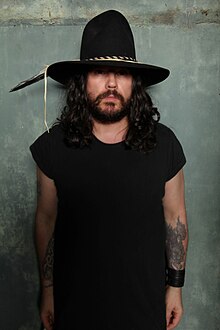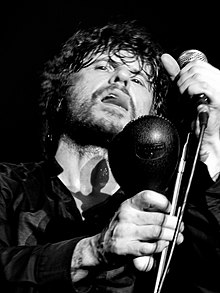music.wikisort.org - Musician
Ian Robert Astbury[2][3] (born 14 May 1962) is an English singer, best known as a founding member, lead vocalist and frontman of the rock band the Cult.[4] During various hiatuses from the Cult, Astbury has fronted the short-lived Holy Barbarians in 1996, and later from 2002–2007 served as the lead singer of Riders on the Storm, a Doors tribute band that also featured Ray Manzarek and Robbie Krieger from the original Doors. He replaced Rob Tyner during an MC5 reunion in 2003, as well as appearing on several one-off guest vocal performances on other artist's songs.
This biography of a living person needs additional citations for verification. (December 2021) |
Ian Astbury | |
|---|---|
 Press photo, 2010 | |
| Background information | |
| Birth name | Ian Robert Astbury |
| Born | 14 May 1962 Heswall, Cheshire, England |
| Genres | Post-punk, gothic rock, hard rock, heavy metal, alternative rock[1] |
| Occupation(s) | Singer, songwriter |
| Years active | 1981–present |
| Labels | Beggars Banquet |
| Member of | The Cult |
| Formerly of | Southern Death Cult, Death Cult, the Doors of the 21st Century, Holy Barbarians |
Early life
Ian Astbury was born in Heswall, Cheshire,[5] and is of Scottish and English descent.[6] He moved with his family to Hamilton, Ontario, Canada, from England in 1973 when he was 11. He attended Glendale Secondary School. Astbury's early musical influences took root in Hamilton, where he became a fan of David Bowie, Iggy Pop and The New York Dolls. He did not start performing until after his return to England.[7]
In 1979, while living in Glasgow, Astbury was influenced by the Doors' song "The End", which he heard while watching the film Apocalypse Now, later describing this as "a religious experience".[8]
Career
Early career
In 1980, Astbury was in Liverpool, where he was active on the punk scene based around Eric's Club. He moved to Bradford in late 1980, and by 1981 he helped found the post-punk band Southern Death Cult, which lasted until March 1983. Along with guitarist Billy Duffy, bassist Jamie Stewart and drummer Raymond Taylor Smith, Astbury formed a new band, Death Cult, and released the Death Cult EP. To help broaden their appeal, the band changed its name to "The Cult" in January 1984 before appearing on the Channel 4 television show, The Tube.
The Cult's first album, Dreamtime, was released in 1984, followed by Love in 1985. Love featured the single "She Sells Sanctuary", which introduced the band to an international audience. Many songs of these early albums focus on Native American themes, a preoccupation of Astbury's. On their third album, Electric, The Cult made a transformation to a hard rock sound with the help of producer Rick Rubin.
After the release of the 1989 album Sonic Temple and the single "Fire Woman", Astbury relocated to Los Angeles, California, US.
1990s
In 1994, The Cult returned with an untitled album and a musical change of pace. Their hard rock sound was gone, as a result of Astbury's growing interest in alternative music, fashion and introspective lyrics. Although the album produced two singles ("Coming Down" and "Star"), it was not a commercial success. They toured to support the album, but in Brazil creative differences with guitarist Duffy reached their nadir, which resulted in him leaving the band.
Astbury soon assembled another group of musicians and began writing new songs. He called the group The Holy Barbarians, and in 1996 the band released the album Cream, which was not a commercial success. The band appeared at the small Tunbridge Wells Forum, where Vic Reeves joined the band onstage for a rendition of "Wildflower".
Personal difficulties and a drive for further introspection drove Astbury away from his new group, and he began working on a solo album (eventually released as Spirit\Light\Speed).
In 1999, Astbury and Duffy reformed The Cult. The band signed a new contract with Atlantic Records, and in 2001 Beyond Good and Evil was released. The band initially enjoyed radio success with the single "Rise", until a falling out with Atlantic, which ended all commercial promotions and radio play for the album. Astbury described the fight with the record label as "soul destroying"; disillusioned, he brought The Cult to another hiatus in 2002.[citation needed]
2000s and beyond

Astbury became lead singer of The Doors of the 21st Century in 2002. The group featured original Doors members Robby Krieger and Ray Manzarek.[9][10]
In 2003, Astbury performed with the surviving members of MC5 at the 100 Club in London.
He re-formed The Cult with Duffy in 2006, for a series of live shows.[citation needed] In October 2007, The Cult released Born into This, including the single was "Dirty Little Rockstar".[citation needed] In 2009, The Cult announced a series of shows across Canada, the US, and various countries in Europe. It was billed as "'Love' Live", where the band performed the album, Love, in its entirety.[citation needed]
On 29 May 2010, the Japanese band Boris performed "The End" with Ian Astbury at Vivid Festival in Sydney.[11] Boris and Astbury released a four-song EP in September 2010 on Southern Lord and Daymare Records, containing four tracks entitled "Teeth and Claws," "We are Witches," "Rain" and "Magickal Child."[12][13][14]
Other musical ventures
Astbury is featured on the UNKLE tracks "Burn My Shadow", "When Things Explode" and "Forever." He also sings "Flame On" on Black Sabbath lead guitarist Tony Iommi's solo album Iommi, and recorded a duet with Debbie Harry on her 1989 album Def, Dumb and Blonde, called "Lovelight".
In 2010, he provided the vocals for the song "Ghost" on guitarist Slash's self-titled solo album. The track also featured former Guns N' Roses guitarist Izzy Stradlin on rhythm guitar. Astbury is also credited for playing the drums on a track called "Gasp" by Japanese Cartoon.[citation needed]
Personal life
Astbury lives in Los Angeles. He has played on the football team Hollywood United with Billy Duffy and Steve Jones of The Sex Pistols. He is a supporter of English Premier League club Everton FC.[15] He married his first wife Heatherlyn Astbury in May 1992; they have two sons.[citation needed] On 26 May 2012, Astbury married The Black Ryder singer and guitarist Aimee Nash in Las Vegas.[16]
Discography

The Cult
- Dreamtime (1984)
- Love (1985)
- Electric (1987)
- Sonic Temple (1989)
- Ceremony (1991)
- The Cult (1994)
- Beyond Good and Evil (2001)
- Born into This (2007)
- Choice of Weapon (2012)
- Hidden City (2016)
- Under the Midnight Sun (2022)
Holy Barbarians
- Cream (1996)
Solo
- Spirit\Light\Speed (2000)
Guest appearances
- Deborah Harry – Def, Dumb & Blonde (1989) on "Lovelight"
- The Four Horsemen (band) – Rockin is Ma Business (1991) on "Nobody Said it Was Easy" Nobody Said It Was Easy album 91- Ian Astbury appears on percussion,backing vocals and consulting
- Messiah (UK band) – 21st Century Jesus (1993) on "Creator"[17]
- Circus of Power – Magic and Madness (1993) on "Shine"
- Tony Iommi – Iommi (2000) on "Flame On"
- Stoned Immaculate – The Music of the Doors (2000) on "Touch Me"
- Unkle – War Stories (2007) on´´Forever´´ "Burn My Shadow" and "When Things Explode"
- Slash – Slash (2010) on "Ghost"
- Boris – BXI: Boris & Ian Astbury (2010)
- Unkle – Only the Lonely (2011) on "Forever"
- Nine Inch Nails – Bad Witch (2018) on "Shit Mirror"
- DJ Witchman & Ian Astbury ´´Angels Art song´´
- Zen Mafia-California song and video
- Fuzztones, Several songs live and studio "Down on the Street", ´´Cheyene Ryder ´´ ´´I´m Eigtheen´´
- Steve Jones Fire and Gasoline album, producer, backing vocals, percussion, words and vocals on "I Did U No Wrong" with Jones and Axl Rose
- Zilch Japanese project 5 songs on Lead Vocals Ape Messiah and "Hide and Seek"´´Virusmaker number 7, Make mothersfuckers wake up etc
- Japanese cartoon album 2010-Lupe Fiasco Ian Astbury appears on drums, percussion, backing vocals and consulting not credited on the album.
References
- "Ian Astbury – Biography, Albums, Streaming Links – AllMusic". AllMusic. Retrieved 22 January 2018.
- Olson, Steve. "Ian Astbury / The Cult". Juice. No. 63. Retrieved 29 May 2011.
- Cult Biography, Camelot Music 1988
- "The Cult | View the Music Artists Biography Online | VH1.com". Retrieved 3 April 2010.
- Larkin, Colin (2011) The Encyclopedia of Popular Music, Bish Bash Books, ISBN 978-1846098567, p. 461
- "Riding the Storm Again – without Morrison". Mail & Guardian. 1 September 2003. Retrieved 3 June 2022 – via Mg.co.za.
- Graham Rockingham (10 June 2016). "Interview: Ian Astbury of The Cult and Hamilton". The Hamilton Spectator. Retrieved 12 April 2017.
- C.B.Liddell (9 May 2010). "Y'know – interviews with the famous: Ian Astbury, musician". Yknow-interviews.blogspot.com. Retrieved 14 October 2011.
- Ross, Mike (24 July 2005). "Long live the Lizard King". Edmonton Sun. Retrieved 9 August 2010.
- Zahlaway, Jon (31 May 2005). "The Doors of the 21st Century head up 'Strange Days' fest". LiveDaily. Archived from the original on 24 October 2007. Retrieved 9 August 2010.
- Archived at Ghostarchive and the Wayback Machine: "Ian Astbury and Boris The End @ Sydney Opera House 2010". YouTube. Retrieved 14 October 2011.
- Dombal, Ryan (2 June 2010). "Boris Team With the Cult's Ian Astbury". Pitchfork Media. Retrieved 9 August 2010.
- "商品詳細". Diwproducts.com. Retrieved 14 October 2011.
- "Southern Lord Records " BXI= Boris Collaboration With Ian Astbury!". Blog.southernlord.com. Retrieved 14 October 2011.
- Gourlay, Dom (3 June 2012). ""Not that many bands seem to give a shit but we do. We always have" : DiS meets Ian Astbury of The / In Depth // Drowned In Sound". Drownedinsound.com. Archived from the original on 25 November 2020. Retrieved 15 May 2020.
- Laudadio, Marisa; Dodd, Johnny (29 May 2012). "The Cult's Ian Astbury Weds in Las Vegas". People. Retrieved 3 June 2012.
- "21st Century Jesus [US] – Messiah | Songs, Reviews, Credits". AllMusic. Retrieved 5 April 2019.
External links
На других языках
- [en] Ian Astbury
[es] Ian Astbury
Ian Robert Astbury (n. Cheshire, Inglaterra, 14 de mayo de 1962) es un cantante, músico de rock y actor británico. Es reconocido por ser el líder de la famosa agrupación The Cult y también por ser el cantante de la banda de blues rock The Doors of the 21st Century, formada por antiguos miembros de The Doors en 2002.[1][2] Esta figurado en el puesto 90 en el listado Los 100 mejores vocalistas del Metal de todos los tiempos.Другой контент может иметь иную лицензию. Перед использованием материалов сайта WikiSort.org внимательно изучите правила лицензирования конкретных элементов наполнения сайта.
WikiSort.org - проект по пересортировке и дополнению контента Википедии